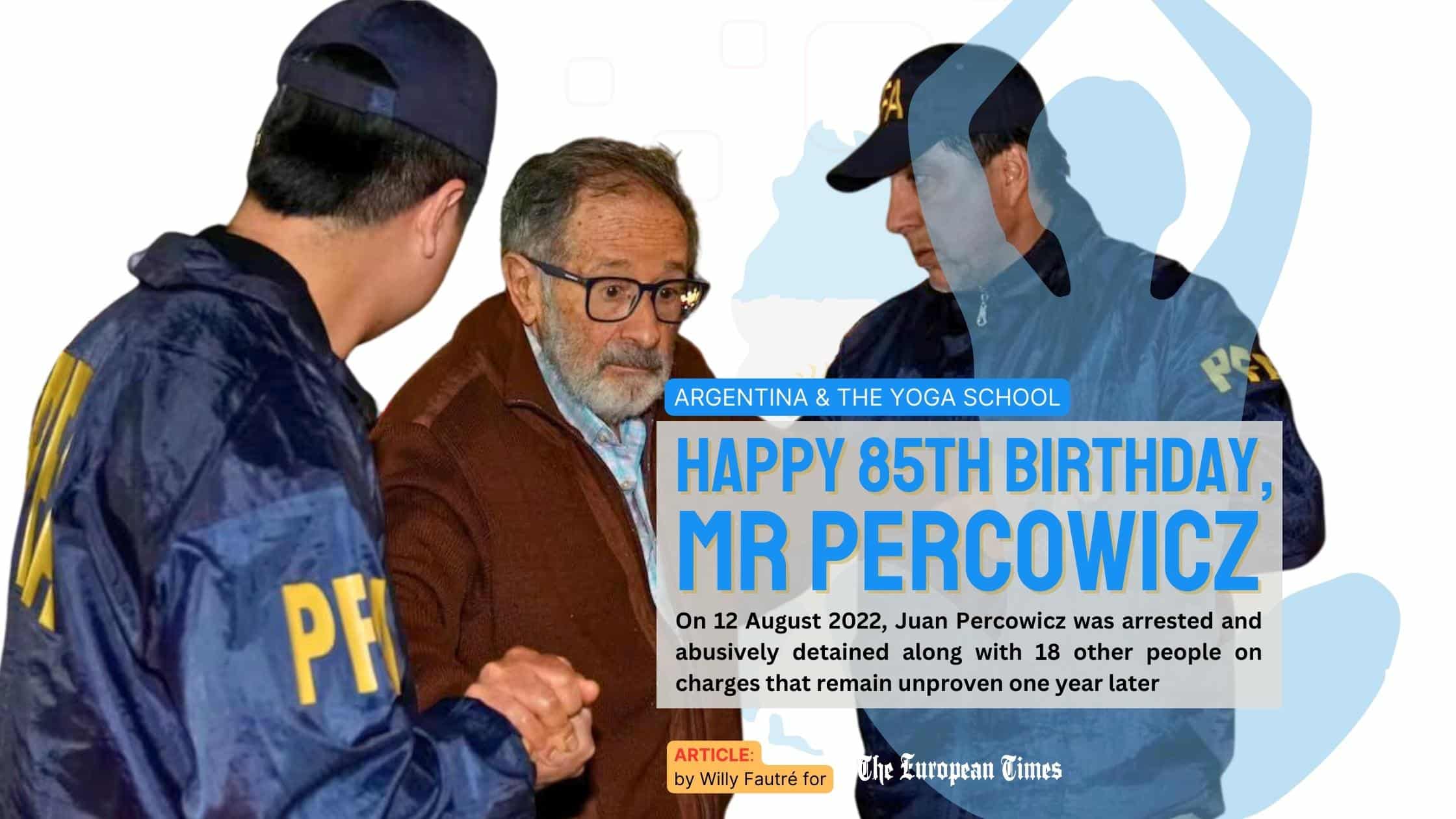Today, on 29 June, Juan Percowicz, the founder of the Yoga School of Buenos Aires (BAYS), is 85 years old. Last year, six weeks after his birthday, he was arrested with 18 other people from his yoga school and detained for 18 days in a cell with nine other prisoners in inhuman conditions. When he was released from the Argentinian prison hell, he was kept in home detention for 67 more days.
HRWF has recently interviewed Juan Percowicz who during his professional life as a certified public accountant and a licentiate in administration. In 1993, he was honoured by the World Education Council for his labor as an educator.
One year after his ordeal, he remains innocent of the charges brought against him by a person whose name is still undisclosed: trafficking in women for sexual exploitation and money laundering. However, every one of the alleged victims has denied being such.
As in many other countries, including in the European Union and other democracies, there are serious abuses of custody and pretrial detention in inhumane conditions and for disproportionate periods. Argentina is no exception to the rule and Mr Percowicz was a victim of such abuses.
Arbitrary detention in inhumane conditions in Argentina is an issue that needs to be raised at the United Nations and in other international fora.
The raid of a fully armed police SWAT team
Q.: In which circumstances were you arrested in a massive raid targeting about 50 private homes?
Juan Percowicz: On 12 August 2022 I was resting in a house that I had rented to recover from the persistent after-effects of two years of confinement and immobility due to the COVID pandemic. I had almost stopped walking during that period. I was moving with great difficulty because of a stroke and only with a cane.
On that fateful evening, I was lying on my bed when suddenly there was a deafening roar followed by many screams and threatening voices. I could hear people running around everywhere inside but I couldn’t understand what was going on.
I was very scared because I was not used to getting visitors and even less so without warning. My first thought was that thieves had broken in.
I soon saw two of my people lying on the floor and people in uniform pointing long guns at them.
I could hear a lot of shouting and I began to distinguish some words “Nobody moves, this is a raid”.
Everything was confusing and above all violent, very violent.
I could not understand why we were treated like dangerous criminals. I never had anything to hide or anything to feel at fault for.
The first thing they did was to take us all to the living room, screaming and handcuffing us, ordering us not to talk to each other or they would separate us. There were five of us and more than 10 of them.
They read us our names and told us that after going through the whole house, which they did with a lot of violence, they would read us their search report.
We could not understand what was happening. Our lives depended on a group of men in uniform who were not willing to explain to us immediately what was going on or what crime we were supposed to have committed. We had to make a lot of efforts to remain quiet without protesting.
The raid, the shouting and the threats lasted for about 15 hours throughout the night.
They searched the whole house. They took all the electronic devices, computers, silver coins from a collection, all the personal papers they found, personal diaries and notebooks and all the money we had, even what we had in our wallets and many other things.
They told us that the procedure was being carried out in about 50 places at the same time, including my home. This made me even more afraid because it was so disproportionate and incomprehensible.
I could not rest all night because of the procedure and the threats.
On the next day at noon, we were transferred to the police station.
The interrogation
Q.: How did the transfer occur?
Juan Percowicz: On the trip I got sick and vomited several times.
When they took us out of the house, they took pictures of us handcuffed in front of a poster. They filmed us as we left and all the pictures were soon published in the press saying that they had disbanded “a cult of horror” and imprisoned the leader.
They told us that they were detaining us to take our data and then they would release us. However, after many hours spent in the police station where they took our fingerprints several times and asked us several times for our personal data, they told us that we were going to be detained.
Those who were arrested with me desperately tried to call the policemen to reason. They told the guards that my life was in great danger if I did not get the medical care and the medication I needed and insisted that they should consider my age, my state of health and my pathologies, but in vain.
The officers were constantly whispering with pride among themselves about the great catch they had made.
The detention
HRWF: How were your detention conditions?
Juan Percowicz: I was taken along with nine companions to a deep, dark and damp basement.
They lowered me down in a dirty wheelchair that we managed to get but I could fall at any time and get seriously injured while going down a steep staircase.
They took my cane and my belongings. I had brought my blood pressure monitor and a glucose measuring device because I am diabetic. They took them from me when they stripped me of my clothes to control my health.
I was very cold, hungry and thirsty.
I was then led down some dark, gloomy, faded and dirty barred corridors to the basement.
Along with the growing confusion and bewilderment, it seemed that the spaces were shrinking and becoming more and more gloomy and threatening.
We tried to encourage each other, but inside we had a feeling of total insecurity and helplessness.
We arrived at a space measuring approximately 5 x 4 m, dark, windowless, very humid, and inhospitable, with bars separating it from the corridor. I understood that it was our cell. The floor was entirely covered by the mattresses on which we were to sleep. They were absolutely broken, stripped and dangerously dirty. In a corner, there was a hole in the floor to be used as a toilet and a sink without any water.
I could never have imagined in my life that one day I would live for 18 days in such conditions.
I can hardly walk, as I said, and I had to sleep on the floor but I was very grateful to be with companions who could help me to move at any time. Alone, I would never have managed it. There was no decent bathroom or water nearby.
We still did not understand what was happening and why we were prisoners. We had no answers and nothing made sense. There was nothing to justify our deprivation of freedom in such awful conditions.
On the next day our comrades who were free managed to bring us some food and some protection against the cold and the humidity.
I was also worried about the health and well-being of those who were with me. Some of them had some pathologies and needed specific care.
At the court
Q.: When were you taken to court and how was the media coverage?
Juan Percowicz: Three days after the raid, I was taken in a wheelchair to the court in Comodoro Py to testify. When we were leaving the police station, they made us get in and out of the truck twice because the person filming the transfer did not get the filming right. I was taken handcuffed in a transport truck.
In Comodoro Py the magistrates read some illogical and unintelligible accusations, which corresponded more to a fantastic novel than to reality.
Once again, when I got off, media people were filming. My photo was in the news all the time with the most infamous and lying stories. Every time there was a transfer, people were filming us: the media and the police. I was repeatedly presented in the media as a corrupt, diabolical and dangerous person, without any reason or evidence of any kind to support such a hypothesis. My reputation was shattered and soiled, damaged forever.
Inhumane detention conditions for 18 days
Q.: How was the daily life in detention?
Juan Percowicz: There were three guard shifts.
The guard who arrived in the morning at about 5:30-6:00 would take a head count to make sure we were all there.
I will never forget the noise of the keys opening bars and moving irons and padlocks. Every morning I was wondering for how many more days the whole nightmare would go on.
During the night I was trying to rest but I had to get up many times to urinate, and in those deplorable conditions much more than usual.
We had breakfast thanks to the things that our companions brought us from outside.
Every time I moved, I needed the help of three of them to get up and move around, because as time went on my body became more and more numb.
Once the comrades tried to pour water with a bucket over the sink that did not work, but the drain was broken and the water came out on the floor of the cell and the mattresses got wet.
Our cell could only get some light from a low-intensity bulb in the entrance corridor, too far away to be efficient.
We did not know if it was night or day. Our only landmark was the changing of the guard.
One day the sewage drain in the latrines was clogged and dirty water began to come out through a drain a few meters away. We had to lift our mattresses so that they would not get wet with the infected water. Some of our colleagues unclogged the pipes with tape but had to endure grabbing and splashing faecal matter in order to keep us from being flooded with shit. All this took place in the dark.
Everyone was very worried about me and I was worried about them. The situation was desperately incomprehensible to everyone. The days went by and nothing was changing. I did not know how or when it would end.
Back home with an electronic anklet and a trauma
Q.: How was your life when you were under home arrest?
Juan Percowicz: Eighteen days after my detention I was transferred to my home to continue my captivity in house arrest with an electronic anklet.
In the meantime, my health had seriously deteriorated, my body was numb, my legs were swollen and I was almost almost unable to walk. I was physically very weak.
I could not leave the apartment at all. A policeman came in the morning and another one at night to check me and my anklet. I also could not have any contact with the outside world. That lasted for 67 days.
To this day I have had nightmares of persecution. Sometimes I try to watch some news or programs about the raid and the judicial procedures broadcast during my incarceration but it is too painful. I am still deeply hurt by the determination of some to destroy us and by the malice of an infamous press.
I am deeply grateful to God for having kept me alive in such adverse moments and in the company of friends who protected and defended me at every step.
More reading
A yoga school in the eye of a media cyclone
Nine women sue a state institution abusively calling them “victims of sexual abuse”
The Great Cult Scare in Argentina and the Buenos Aires Yoga School 1. Raiding an Old Ladies’ Cafe
The Great Cult Scare in Argentina and the Buenos Aires Yoga School. 2. An Accountant-Philosopher and His Friends
The Great Cult Scare in Argentina and the Buenos Aires Yoga School. 3. An Eclectic Teaching
The Great Cult Scare in Argentina and the Buenos Aires Yoga School. 4. The Most Dangerous Cult of Them All
The Great Cult Scare in Argentina and the Buenos Aires Yoga School. 5. The Ghost Prostitution














